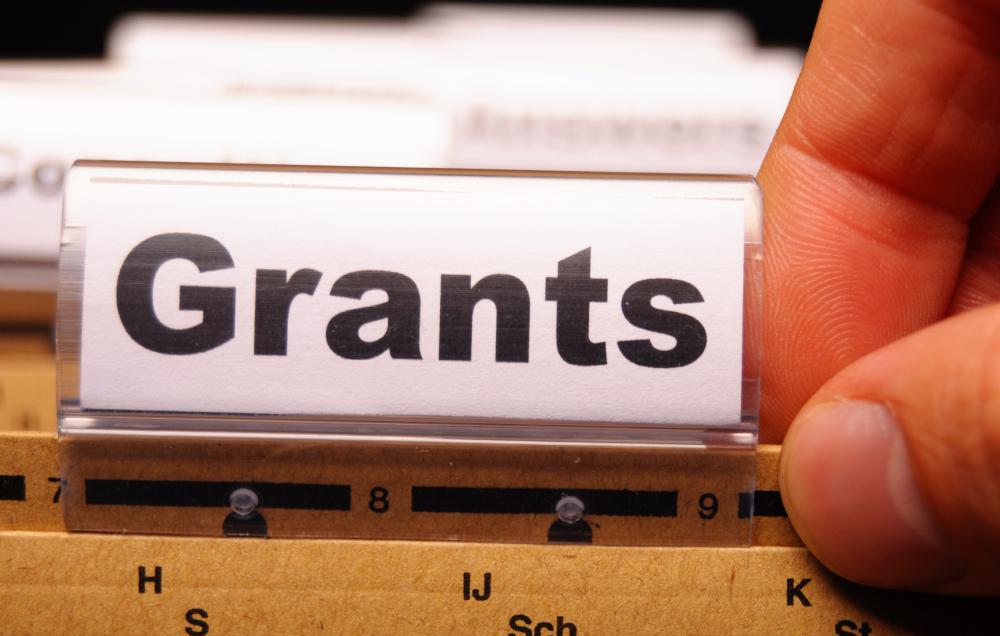At SmartCapitalMind, we're committed to delivering accurate, trustworthy information. Our expert-authored content is rigorously fact-checked and sourced from credible authorities. Discover how we uphold the highest standards in providing you with reliable knowledge.
What are the Different Types of Federal Grants?
A federal grant is a form of monetary assistance given to an individual or group from the government. In the U.S., federal grants may only be given to carry out public purposes of support as authorized by national law. Federal grants do not directly benefit the government. The U.S. has 26 federal agencies that offer over 1,000 different grant programs. In other countries, governments use subsidies or private charities to fund projects that require these grants.
Federal grants are most commonly issued by non-profit organizations or charities. Federal government grants may be unrestricted in terms of use, or they may come with specific guidelines as stated at the time of administration. Federal grant money can be classified in two ways: direct grants and pass-through grants. Direct grants are given directly by the government to an individual or group who applied for the money. Pass-through grants require the state to apply to the government for the grant, then the state hands out the federal grant to the organization that requested it.

A federal government grant can further be classified as competitive or formula. A competitive grant, or project grant, is one which several groups are vying for because the amount of money is limited. A group of peer reviewers makes the decision by scoring applications and assigning the one with the highest number of points the grant. A formula grant does not involve competition with other groups; the government simply distributes formula grants based on set standards. An application must be completed and submitted to the government, upon receipt of which the government hands out the grant.

A few additional types of federal grants include categorical, block and earmark grants. Categorical grants have restrictions and dictate that the free federal grants must only be spent on projects or causes that fall within certain categories. Groups who receive categorical grants are often asked to match a set amount of the grant awarded. About a third of categorical grants are formula grants, so since most of these grants are awarded competitively, the restrictions make sense.
Block grants are similar to categorical grants, except they are lumped together in one category. Even though the money can only be used for projects within one category, those who receive block grants have fewer restrictions on the use of the money than categorical grant recipients. All block grants awarded are formula grants. Earmark grants are regulated by the U.S. Congress and are controversial for their steep involvement in politics. They are not given out competitively; instead, political lobbyists pay high prices to receive them.
AS FEATURED ON:
AS FEATURED ON:












Discussion Comments
There are many online websites where you can search for different grant programs that you can apply for. My son works in real estate and he has worked with people who have received federal housing grants.
There are grants available for just about everything you can imagine. I don't know how easy it is to qualify for some of the federal grants, but I think it would certainly be worth the trouble to apply for one.
I know there are special grant programs available for minorities. I have a friend whose grandparents were Native Americans, and she received a federal grant for an organization she was working with.
It seemed like it was a lengthy, complicated process, but was worth all the trouble in the end.
I was involved in a small local community theater that applied for some government federal grants. One of the staff members was knowledgeable about applying for grants, and they were able to receive some grant money.
This was a very small, fledgling theater company and the grant money helped keep it going and added some new life to that community theater.
If they had not received the money when they did, I don't think they would have been able to continue putting on productions for much longer.
I am not aware of all the different categories that are available for grant applicants, but I imagine there are more possibilities than what most people realize. It is just a matter of finding out exactly what is available.
I think the restrictions for federal government grants for students have become more difficult to meet. I went to college many years ago, and part of my expenses were also paid with a grant.
Recently the son of my friend applied for some federal grant money to go to school, and he was only given a small amount. His mom is a single parent with three kids, who does not receive any other financial support.
She does not have a college education and does not make very much money to raise a family of four on. I was surprised that he did not qualify for more grant money than he did.
There are many situations where that type of grant money makes a difference in whether someone will be able to attend college or not.
In his case, he also applied for student loans which allowed him to attend college, but he knows he will have to pay the loan money back.
When I went to college I was awarded some federal student grants each year. My parents did not make a lot of money, and these grants enabled me to get a college education.
The grant money I received usually covered the cost of the books and tuition. I also worked while going to college to cover the cost of my living expenses. I was able to graduate with most of my college paid for.
The nice thing about receiving a grant for your education is that you don't have to pay it back. If you take out a student loan, all of that money has to be paid back over time.
Post your comments